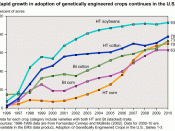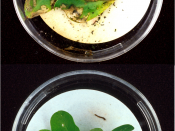Over the past decade, biotech crops or so called GM crops has became a big controversial. There are many arguments on Pros and Cons of the genetically modified food debate. The main two topics of the argument are the benefits and the risks. The benefits which are herbicide tolerant crops encourage less tilling, less soil erosion, and better yield, and the risks are the possible of creating new or more vigorous pests and pathogens, harm to "non target" beneficial (1). food
What Is Plant Biotechnology? Plant biotechnology is the process of transferring isolated genetic material of organisms to specific plants so that the plants carry and reproduce desired genetic traits that farmers or consumers desire. These plants often
have been produced by techniques in which "foreign" genes are inserted into the microorganisms, plants, or animals. Foreign genes are genes taken from sources other than the organism's natural parents. In other words, GM plants contain genes they would not have contained if researchers had used only traditional plant breeding methods (2).
The best argument for genetically engineered crops is the opportunity they present to help people with insecure food supplies, especially in developing countries. The genetically modified to resist drought can help increase crop yields, thus, giving these poor farmers genetically modified seeds will give them the opportunity to survive and even pull themselves out of poverty. Another potential of genetic engineering is that the modified seeds can produce crops fortified with vitamins. Millions of impoverished and malnourished children in poor countries developed night-blindness every year because they lack a good source of vitamin A in their diets. The potential to help the Third World is real and cannot be ignored. Moreover, "It is important to recognize that we have been genetically modifying the food supply for thousand of years," says...



Genetic modification of crops
Quite the informative piece. Not only is it detailed, thorough and well researched but it is grammatically well structured and well written. It flows smoothly and the authors efforts paid off with piece that is well rounded grammatically, technically and fundamentally.
If anyone finds something missing, the references included are quite thorough. This piece is an excellent research item.
Great Job, pepham.
4 out of 4 people found this comment useful.